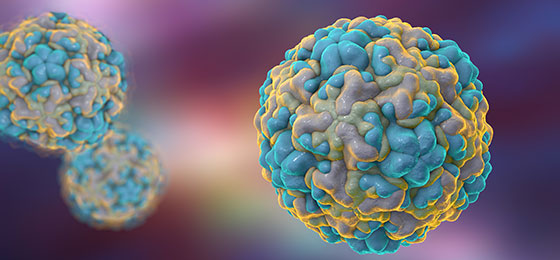

Researchers funded by the SNSF have discovered mutations that worsen respiratory infections among children. Their study explain the mechanism involved.
Colds that are not linked to influenza are generally benign. Still, 2% of each generation of children have to go to hospital following a virulent infection. “These respiratory problems are responsible for 20% of child mortality around the world”, says Jacques Fellay, who has held an SNSF professorship since 2011. “It is truly a silent epidemic.”
An international research collaboration coordinated by Fellay has discovered the reason for some of these infections: they are caused by mutations of a gene that plays a part in recognising certain cold-inducing viruses. (*)
“We have been able to confirm that a gene, called IFIH1, plays an important role in defending the body against the principal viruses responsible for respiratory infections among children”, he explains. This gene normally helps in identifying the virus's RNA, a type of genetic information related to the DNA. “We have been able to isolate the mechanisms that prevent the immune systems of children with an IFIH mutation from successfully combating the viral infection.”
Hospitals in Switzerland and Australia
The researchers collaborated with various paediatric wards in Swiss and Australian hospitals to study cases of children who needed intensive care after a severe respiratory infection (bronchiolitis or pneumonia) caused by a virus. They excluded premature babies and children with chronic illnesses in order to focus on the genetic causes. The result: of the 120 children included in the study, eight carried mutations of the IFIH1 gene.
“This gene encodes a protein which recognises the presence of a certain number of cold-inducing microbes in a cell, such as the respiratory syncytial virus (RSV) or rhinoviruses”, explains Samira Asgari of EPFL, who designed the experiments. “They attach themselves to the germ's RNA and trigger a cascade of molecular signals that provoke an effective immune reaction.” The researcher has been able to show that three different mutations of IFIH1 render the protein incapable of recognising the virus, thereby preventing the body from defending itself against the infection.
In 2015, Jacques Fellay had already studied the genome of more than 2000 patients and statistically shown which genetic variations influence our capacity to defend ourselves against common viral infections.(**) “The two approaches are complementary”, says Fellay. “A study covering a large number of subjects, like the one in 2015, makes it possible to identify the relevant genes across the entire population; but their variations have only a limited impact on individuals. In contrast, a study focusing on carefully selected patients enables you to investigate mutations that are more rare but also more critical for the patient, and to pinpoint the mechanisms in play.”
Prevention and therapy
These results should prove useful for setting new therapeutic and preventive targets: “At their parents' request, we also tested the siblings of some of the children carrying the mutation to see if they too are more fragile when it comes to infections. If this is the case, parents may decide to keep their child at home during an epidemic, or to go to hospital double-quick if the child catches a cold.”
For Jacques Fellay, this research work aptly illustrates the methods and objectives of personalised medicine or 'precision medicine': “Our bodies' capacity to ward off illnesses can vary greatly. A better understanding of the genetic mechanisms that create these differences will lead to more targeted prevention and therapy. One scenario might involve genetic screening to determine the degree of susceptibility to infections; this could be included in the blood tests that are routinely performed just after birth. But society would need to have a say in deciding which genetic tests are desirable.”
This research is the result of a collaboration between EPFL, the Swiss Institute of Bioinformatics, the universities of Bern, Geneva, Lausanne and Queensland, the University Hospital of Geneva, the Centre hospitalier universitaire vaudois (CHUV) and the children's hospitals of Lucerne and Brisbane.
(*) S. Asgari et al.: Severe viral respiratory infections in children with IFIH1 loss-of-function mutations. PNAS (2017)
doi: 10.1073/pnas.1704259114
(**) C. Hammer et al.: Amino Acid Variation in HLA Class II Proteins Is a Major Determinant of Humoral Response to Common Viruses. The American Journal of Human Genetics (2015); doi:10.1016/j.ajhg.2015.09.008. See also “Genetic variation is key to fighting viruses”
The publications are available online.
Contact
Jacques Fellay
School of Life Sciences, EPFL
1015 Lausanne
Phone: +41 21 69 31849
E-mail: jacques.fellay@epfl.ch
Trump travel ban affected researchers
This study was carried out by Samira Asgari, who obtained a PhD at EPFL in 2016 after completing her studies in biotechnology at the University of Teheran. In January 2017, she was denied entry to the United States, where she was expected to take up a position at Harvard Medical School. The refusal of entry occurred following the travel ban issued by the Trump administration and made headlines both in Switzerland and the US. It prompted the SNSF to offer help to all researchers affected by the ban. Samira Asgari has since been able to join Soumya Raychaudhuri’s lab in Boston, where she works on the genetics of tuberculosis thanks to a postdoc fellowship from the SNSF.
Weitere Informationen:
http://www.snf.ch/en/researchinFocus/newsroom/Pages/news-170718-press-release-a-…
http://www.pnas.org/content/early/recent
http://actu.epfl.ch/news/genetic-variation-is-key-to-fighting-viruses-4/
http://www.snf.ch/en/researchinFocus/newsroom/Pages/news-170131-us-travel-ban-sn… 'News: The SNSF supports researchers affected by travel ban'
http://p3.snf.ch/project-172101 'Samira Asgari’s postdoc fellowship'












